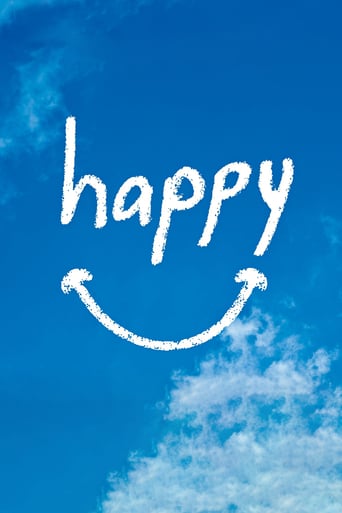

Yes, instead of Gross National Product, the tiny country of Bhutan, nestled in the eastern end of the Himalayas, focuses on Gross National Happiness. In direct contrast to a country like Japan, where workers under too much job-related stress to increase efficiency and minimize errors are dying way too young.That in a way captures the focus of this film, "Happy." It examines the human characteristic of "happiness", what it really is, how one achieves it, and how it relates to our lives in total. The film is a good mixture of human examples in the real world, and researchers explaining their findings.The very first person profiled is a very poor, rickshaw operator in India. But he is happy, because his home is sufficient, and when he gets home from work is greeted by his children. My favorite, because it relates to my own Cajun upbringing, is an extended Cajun family in Louisiana, not wealthy in material things, but enjoying a wealth of happiness from hard work, and sharing the day's seafood haul and enjoying the natural beauty of the waterways and the wildlife.There are two important, but opposing forces, at work in most humans. One is the need to achieve a certain degree of success, wealth, beauty, and recognition. But this requires competition which in itself does NOT bring true happiness. The other force is to give back to the Earth and society, to have friends, to take care of the less fortunate, to be kind to others, to do good deed, to take time to play and laugh and have fun for no reason than to simply be happy.It is this second type of force, which is cooperation rather than competition, that leads to better health, both mental and physical, and in general to longer lives. I can relate, I am retired from a career that required competition to get promotions and bigger pay increases. I was sufficiently successful at that to retire, debt-free, at 50.But in retirement I am much happier, and I believe it is because I now refuse to compete, at anything, I don't gamble, and I play sports only for fun. I often volunteer to help others, even if it is to pause 15 seconds and help a stranger with loading their car with heavy groceries. It just seems like the right thing to do. Or simply greet a stranger with "Good day" and a smile.The film makes the point, doing the things that make us happier may not take much effort at all, it is just being ourselves and reminding ourselves that being happy is simply an activity that needs to be practiced, just like anything we enjoy.Good film, I wish everyone could see it.
... View MoreThis is a movie where the subject matter is far more important than the quality of the movie itself (which is good). Had I received messages like this when I was young, I am sure I would have made fewer mistakes.Young persons understand that happiness is a life goal but they are often confused among conflicting messages on how to get there. By illustrating those who have achieved happiness as well as those who have not, the movie could potentially be very useful in helping young people make responsible and fulfilling life choices. So hopefully this little movie will be recognized as a motivational tool for the young and used in our classrooms and in other venues where teens might be receptive to its message.
... View More(Spoiler Warning)!!!! This film will make you happy! What an amazing feeling I had after watching this film. Film may not be the correct term in describing this passion project of genius, Roko Belic... I think the word experience is apt. Funded and executive produced by comedy directing legend Tom Shadyac(Ace Ventura, Evan Almighty), Mr. Belic takes us around the globe in a search for what it means to be happy...and we find it! It is hard to put into words what he has accomplished in this riveting and eye-opening documentary, but we see and feel that true happiness is pretty easy to attain. Do yourself and your loved ones a favor. SEE THIS FILM/EXPERIENCE!
... View MoreAn excellent, thought provoking movie that will grab your attention and your heart. This should be required viewing for everyone. It is interesting and rewarding that Hollywood would produce for us a documentary on Happiness but at the same time has been a large contributor to trying to make us believe, falsely, what makes us happy. There is a well done piece also about what doesn't make kid's happy. It seems a shame that the producers found it necessary to search around the world to find happiness. My prayer is that it will abound and be readily evident in and around each one of us.A great movie that will warm your heart, stir your soul and hopefully make you think about a practical application in your own life.
... View More